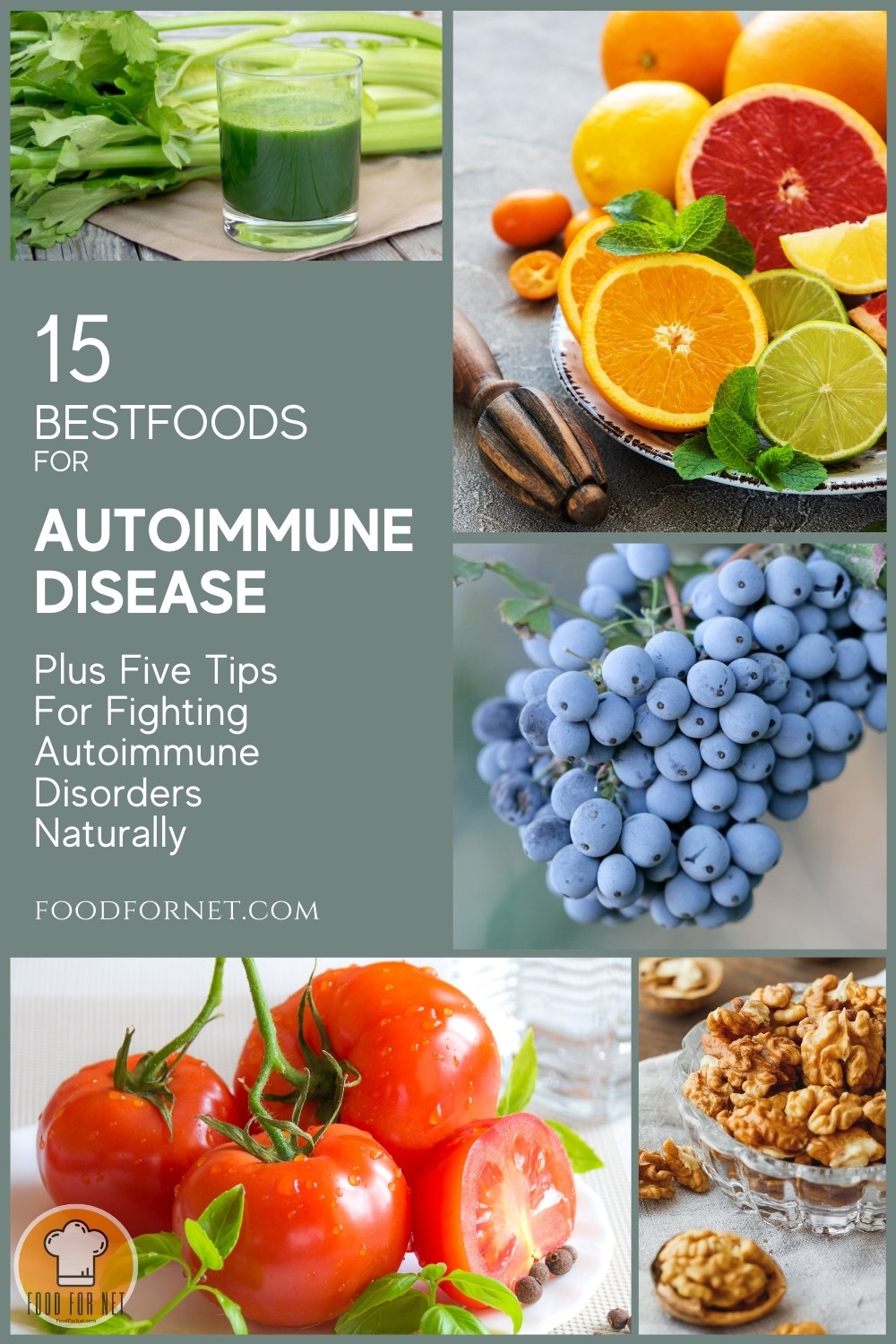
Autoimmune diseases range from thyroid conditions like Hashimoto’s and celiac disease to narcolepsy, rheumatoid arthritis, and lupus. One thing they all have in common is that the body’s immune system attacks the body tissues themselves. It often results in inflammation and pain, but symptoms vary between conditions.
One of the best types of foods to eat to help manage symptoms of autoimmune disease is foods that have anti-inflammatory properties. The 15 best foods for autoimmune disease are packed with vitamins, minerals, and other compounds that fight oxidative stress and inflammation.
If you’re interested in learning more, read through this list of the top 15 autoimmune diet foods. At the end of the article, I’ll share a few more ideas for ways to help keep the symptoms of autoimmune disease at bay.
Best Foods For Autoimmune Disease
Fermented Foods

Fermented foods are great for people with autoimmune diseases because of their anti-inflammatory properties. Fermented foods include yogurt and kefir, as well as fermented vegetables such as sauerkraut and kimchi.
One interesting thing about both sauerkraut and kimchi is they’re made from cabbage. Cabbage and other cruciferous vegetables have several compounds with a wide variety of health benefits. They also contain fiber, which can act as a prebiotic that helps improve the gut microbiome. This is important for people with autoimmune diseases because the flora in the gut makes a difference in how the immune system discriminates between the self and foreign substances.
A one-cup serving of sauerkraut contains 15% of the daily recommended intake for fiber. It also contains 23% of the daily recommendation for vitamin C, which also has anti-inflammatory properties, and 14% for vitamin B6. Some studies have shown that people who are deficient in vitamin B6 also have high levels of chronic inflammation.
Salmon
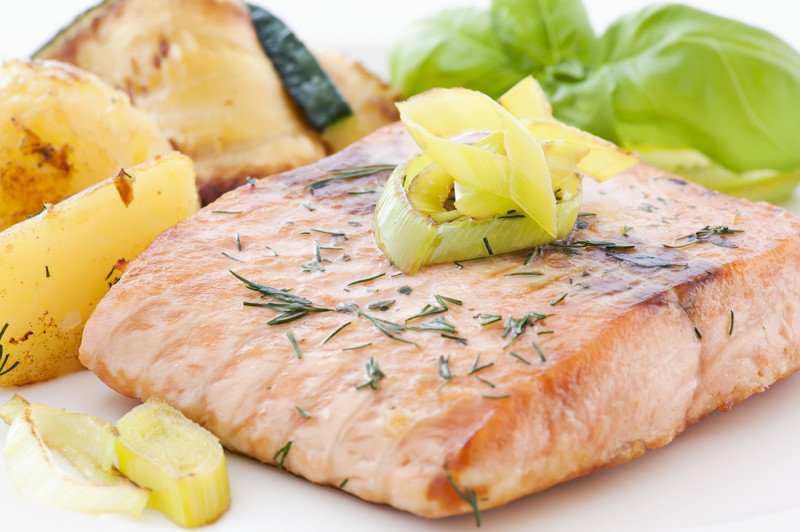
Salmon and other fatty fish such as mackerel, herring, sardines, and trout have high levels of omega-3 fatty acids. Omega-3 fatty acids are great heart health, but they also have anti-inflammatory properties that could help alleviate the inflammatory symptoms of autoimmune diseases.
One three-ounce serving of salmon contains 1.22 mg of omega-3 fatty acids. A small salmon fillet also provides 116% of the recommended daily intake for vitamin D, which could also help with autoimmune diseases.
Salmon is rich in several other supportive vitamins and minerals, too. These include niacin, riboflavin, cobalamin, potassium, magnesium, and phosphorus. This serving size also supplies consumers with 122% of the daily recommendation for the trace element selenium. Low blood serum levels of selenium are associated with inflammation and autoimmune diseases.
Blueberries
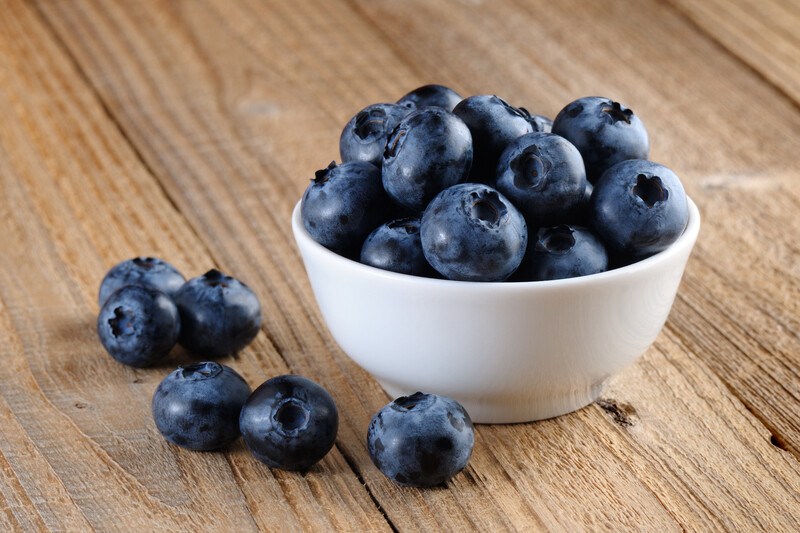
Blueberries are nutrient-rich superfoods that contain a wide variety of compounds that could help with autoimmune diseases. One cup of blueberries contains 13% of the daily recommended intake for fiber, which supports the creation of a healthy gut microbiome, as well as 16% of the daily recommendation for vitamin C, 24% for vitamin K, and 22% for trace mineral manganese.
Manganese is interesting because it’s one of the trace minerals that are usually low in people with autoimmune diseases. Likewise, people with autoimmune diseases also have low blood serum levels of vitamin K.
Blueberries are also rich in vitamin E, several B vitamins, and several other minerals.
Walnuts
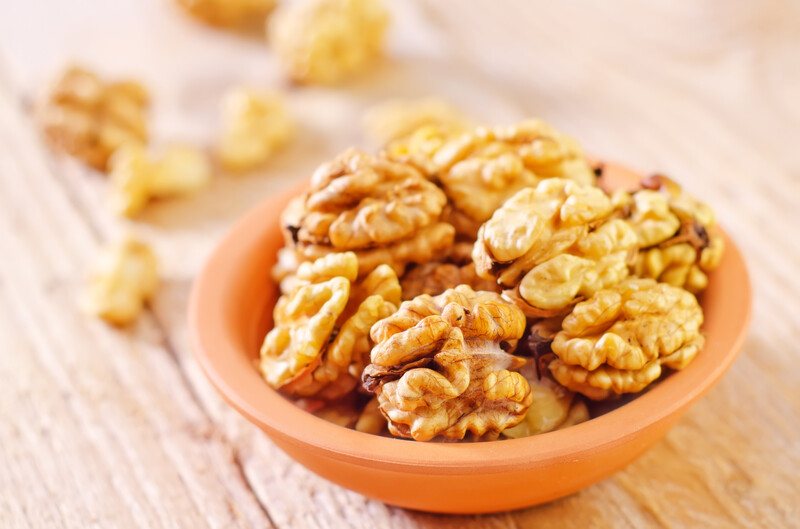
Nuts have a mixed review when it comes to autoimmune diseases. Some people are sensitive to nuts as food allergens, which could actually cause more inflammation in the body. However, for those who can tolerate them, nuts are a rich source of several nutrients that could help with autoimmune diseases.
Walnuts are a good choice because they’re relatively high in omega-3 fatty acids. One ounce of English walnuts contains 2.76 mg of omega-3 fatty acids. Walnuts are also rich in fiber, several B vitamins, folate, and several minerals. One ounce of English walnuts contains 42% of the daily recommendation or manganese.
Spinach
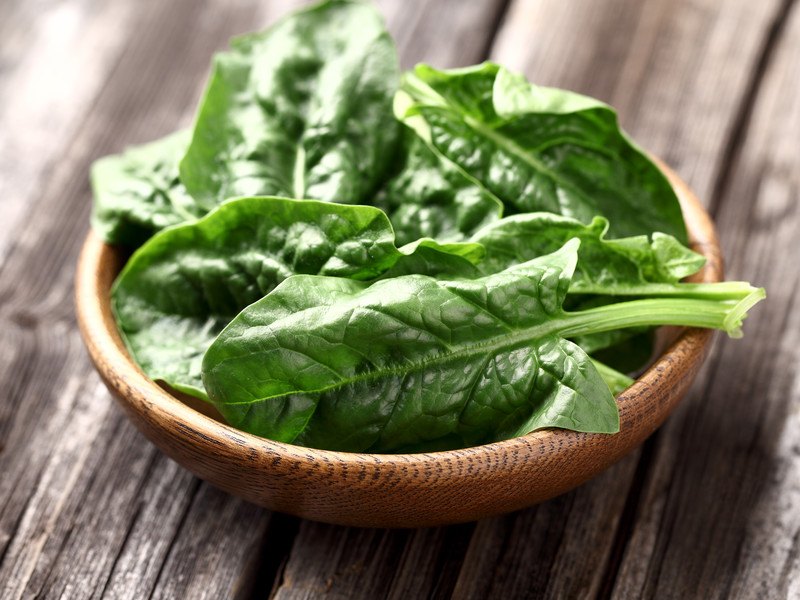
Spinach and other dark green, leafy vegetables are nutrient-dense foods. They contain high levels of fiber, which contribute to the health of the gut microbiome.
One cup of raw spinach provides 15% of the daily recommended intake for folate. Low blood serum levels of folate are associated with greater risks of inflammatory diseases. It’s the same with vitamin A. A cup-sized serving of spinach provides 16% of the daily recommendation for vitamin A.
Spinach is also rich in several B vitamins, vitamin E, minerals such as manganese and magnesium, and 121% of the daily recommendation for vitamin K.
Olive Oil

Olive oil is important for autoimmune diseases because of its high level of healthy fats and antioxidants. It’s a powerful anti-inflammatory food. Around 73% of the content of olive oil is called oleic acid, monounsaturated fat in the omega-9 category.
Olive oil also contains 14% of the daily recommended intake for vitamin K and 18% for vitamin E. Vitamin E is important for fighting oxidative stress, and a vitamin E deficiency is associated with autoimmune diseases.
One nice thing about olive oil is that it’s relatively stable when it’s heated, so it’s one of the healthiest oils to cook with. Besides helping with autoimmune diseases, olive oil supports heart health and prevents strokes.
Cruciferous Veggies
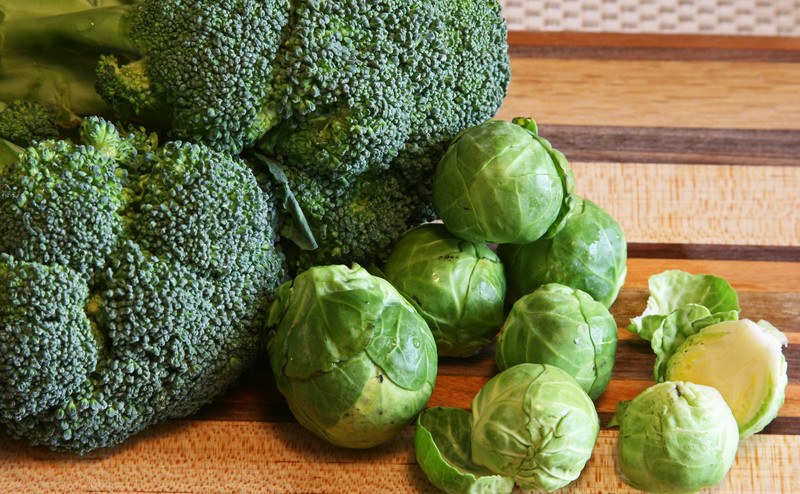
Cruciferous vegetables include all vegetables in the cabbage family, such as cabbage, brussels sprouts, broccoli, cauliflower, bok choy, kohlrabi, and kale.
Cruciferous vegetables contain a powerful compound called sulforaphane. Sulforaphane helps inhibit the inflammatory response associated with autoimmune diseases, and it has a strong antioxidant effect, also. Sulforaphane could also slow tumor growth and protect the DNA.
The profile for vitamins and minerals varies between the different cruciferous vegetables. Some of them are loaded with nutrients. Kale, for example, is both a cruciferous vegetable and a dark green, leafy vegetable. One cup of fresh kale contains 3% of the daily dietary recommendation for fiber, 22% for vitamin C, 68% for vitamin K, 8% for manganese, and an array of other vitamins and minerals.
Citrus Fruits

Citrus fruits are well-known for their high levels of vitamin C. The citrus category includes lemons, limes, oranges, grapefruit, kumquats, pomelos, and several other fruits.
The vitamin C found in citrus fruits has a strong antioxidant effect, and it plays a role in the proper functioning of the immune system. It’s also necessary for the repair of body tissues, wound healing, and many other body functions.
Oranges and grapefruit have the highest concentration of vitamin C of all the citrus fruits. One orange contains 106% of the daily recommendation for vitamin C, along with 14% for folate. Half a grapefruit provides 53% of the daily recommendation for vitamin C and 10% for vitamin K. Both fruits offer a variety of other vitamins and minerals, as well.
Turmeric
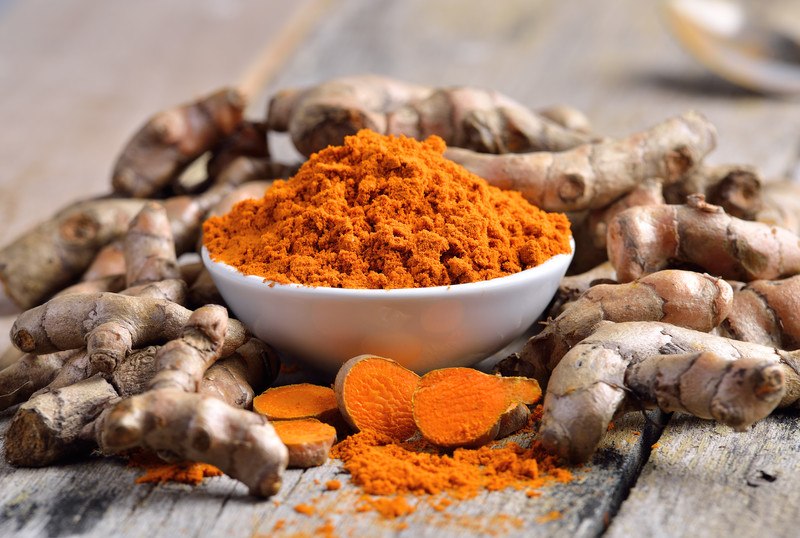
Turmeric, a bright orange spice related to ginger, contains an amazing compound called curcumin. Curcumin is a natural antioxidant and anti-inflammatory, and it could have some anti-aging properties, as well.
Other health benefits of curcumin include helping with metabolic syndrome and pain, lowering the risk of heart disease, preventing cancer, preventing and treating Alzheimer’s disease, fighting depression, and improving brain function.
Beyond curcumin, turmeric contains a few other compounds that could help with autoimmune diseases. One teaspoon of ground turmeric powder provides 26% of the daily recommended intake for manganese.
Avocado
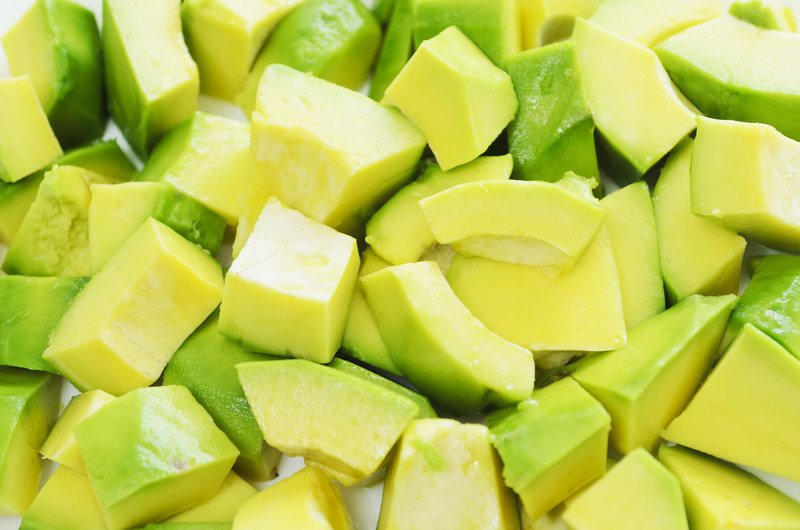
Avocado is a superfood packed with fiber, healthy fats, vitamins, and minerals. One cup of cubed avocado provides 1.65 mg of omega-3 fatty acids. One avocado also provides 36% of the daily recommendation for fiber, 30% for folate, 14% for vitamin E, and 26% for vitamin K.
Avocados supply a variety of other vitamins and minerals, too, including many B vitamins.
Avocados are also a surprisingly versatile food. Because they’re high in fat and low in carbohydrates, they fit well with the ketogenic lifestyle. Some sources indicate that eating a ketogenic diet could help with the management of autoimmune diseases, but more research is needed.
Beans And Lentils
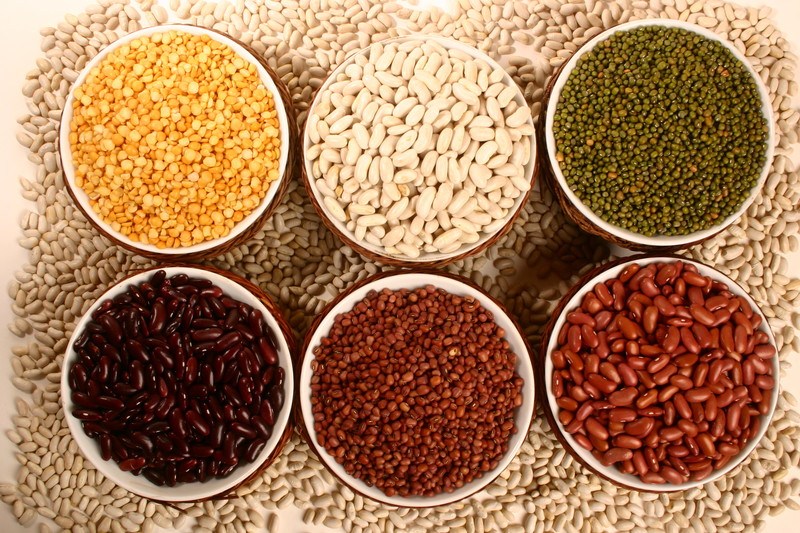
Beans, lentils, and other legumes are great sources of fiber—both the soluble and insoluble types. Fiber helps create a healthy microbiome, which is linked to what the immune system reacts to and could protect the body.
Legumes are also rich in several vitamins, minerals, and antioxidant compounds that could help alleviate inflammation and other symptoms. For example, one cup of raw lentils contains 75% of the daily recommendation for fiber, as well as 230% for folate and 116% for manganese. Lentils also supply a nice amount of B vitamins, vitamin C, and a wide variety of minerals.
One note of caution, though: some legumes can be trigger foods, partly because of the lectins they contain. If you’re not sure, eat them in small amounts until you know whether your body tolerates them.
Sweet Potatoes

Sweet potatoes are known for their high levels of vitamin A, which helps maintain the immune system. A vitamin A deficiency is linked to several autoimmune diseases. One small baked sweet potato provides 80% of the daily recommendation for vitamin A, as well as 10% for fiber. Other nutrients include several B vitamins and minerals.
Sweet potatoes are also a good source of vitamin C, which has antioxidant and anti-inflammatory properties. A small baked potato provides 17% of the daily recommended intake for vitamin C.
Other root vegetables, such as carrots, could also help with autoimmune diseases in similar ways.
Chia Seeds
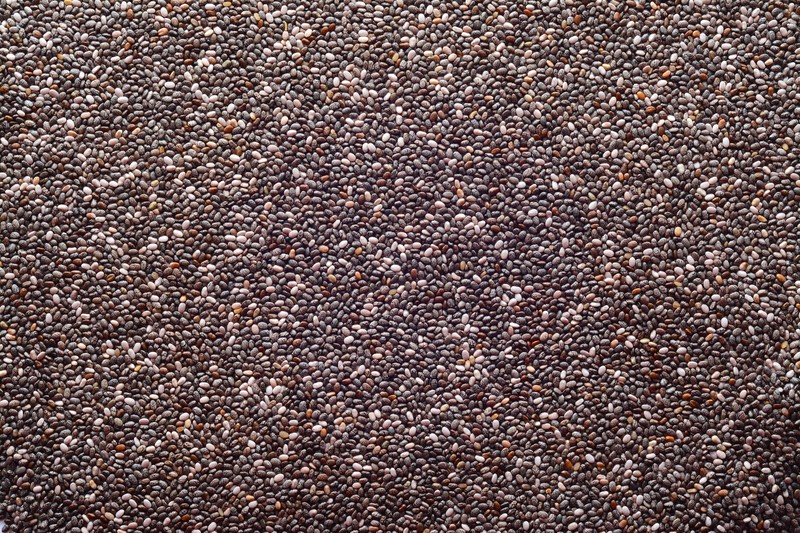
Chia seeds provide several health benefits. Where autoimmune diseases are concerned, chia seeds provide a nice boost to gut health while having strong anti-inflammatory properties. Chia seeds contain high levels of omega-3 fatty acids. At the same time, one ounce of chia seeds provides 28% of the daily recommendation for fiber.
An ounce of chia seeds also contains manganese, several B vitamins, and folate.
Tomatoes

Tomatoes get mixed reviews when it comes to managing the symptoms of autoimmune disease. Some sources recommend avoiding tomatoes and other nightshade vegetables (potatoes, peppers, and eggplant) because alkaloids in them could possibly cause inflammation. Other sources indicate that some alkaloids could actually reduce inflammation.
Some research indicates that certain compounds in tomatoes could contribute to leaky guts syndrome, but those studies have focused on test-tube and animal specimens. Meanwhile, tomatoes add enough nutritional value to be worth considering if your body tolerates them well.
One Roma tomato contains folate, vitamin C, several B vitamins, and several minerals. It’s also rich in powerful antioxidants called lycopene and anthocyanins. Anthocyanins are known to have anti-inflammatory properties that work against inflammation caused by oxidative stress.
Celery

Celery has been promoted as a food helpful for autoimmune diseases because it contains around 25 anti-inflammatory compounds. Celery is also high in fiber and other nutrients that could help control symptoms.
One cup of chopped celery provides 6% of the daily recommendation for fiber, as well as 9% for folate and 25% for vitamin K.
Five Tips For Fighting Autoimmune Disorders Naturally
Now that you’ve read about the 15 best foods for autoimmune disease, it’s time to discuss a few other ways that you can help alleviate your symptoms.
Tip #1: Get More Sun
When you get enough sunlight, your body also synthesizes more vitamin D. Vitamin D acts as an antioxidant and anti-inflammatory agent, which could ease some of the discomfort associated with autoimmune diseases.
Tip #2: Get More Sleep
A lack of sleep can affect the immune system, so getting enough sleep is essential. Interestingly, people with autoimmune diseases also tend to have disturbed sleep or poor sleep quality. If you struggle with sleep, consider ways to tweak your evening routine so that you relax more deeply before bedtime.
Tip #3: Consider A Water Fast
Water fasting can impact several autoimmune disease symptoms in positive ways. In a water fast, you abstain from food but can drink water. Start with just one meal, and work your way up to water fasting for two meals or longer. Consult with your physician if you have questions.
Tip #4: Laugh More
Laughter has been linked to improved symptoms in some autoimmune diseases like Hashimoto’s. Watch a funny movie or spend time with humorous friends to boost the level of laughter in your life.
Tip #5: Sweat It Out
Hyperhidrosis, or excessive sweating, can be a symptom of some autoimmune diseases, as well as night sweats. While it’s uncomfortable, it could play a role in helping rid the body of toxins and excess hormones. You might consider trying a proactive approach, such as sitting in an infrared sauna or taking a hot yoga class.

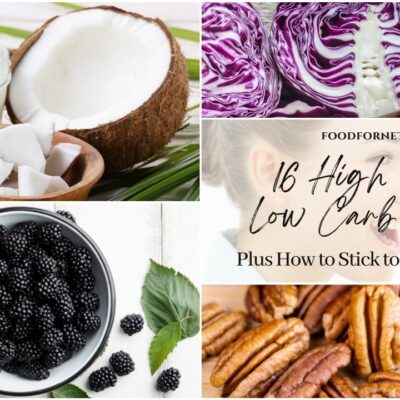






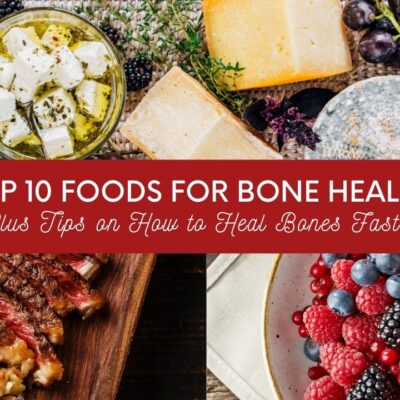





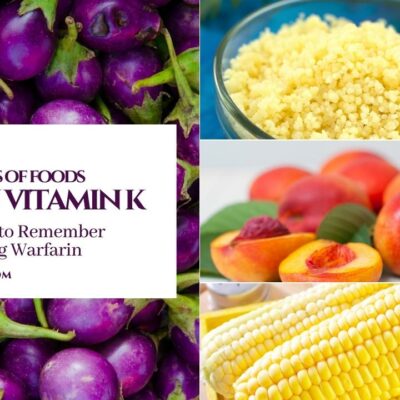


 The Best Caramel Vodka
The Best Caramel Vodka
Leave a Reply